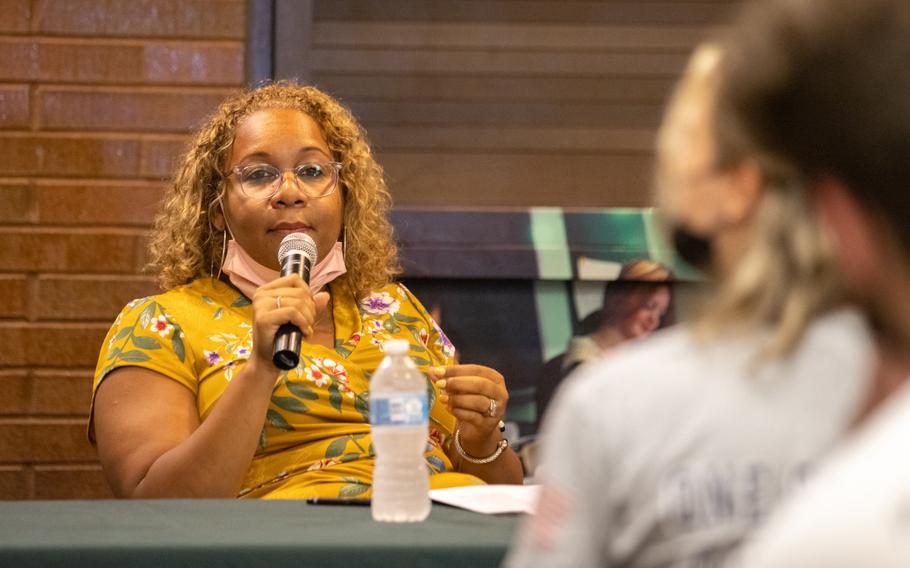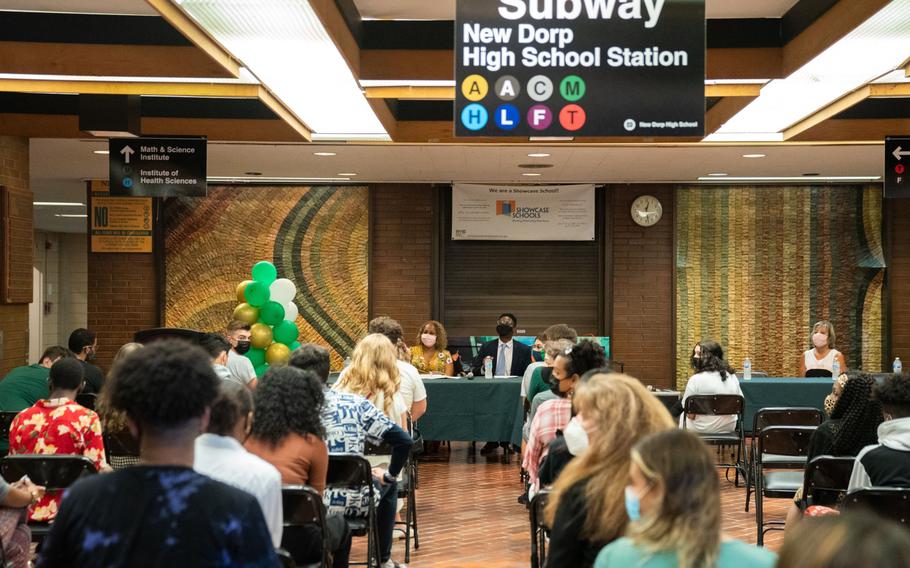
Meisha Porter, chancellor of the New York City Department of Education, speaks during a news conference on the “Vax To School” campaign at a high school in the Staten Island borough of New York on Aug. 10, 2021. (Jeenah Moon/Bloomberg)
In U.S. school districts, debates over safety have devolved into litigation and protests as the first day of class nears. The toxic mix has sparked fear among some parents that their children face a third academic year marred by the pandemic.
Even in New York City, which requires vaccines to eat at restaurants or attend a Broadway show, the Sept. 13 opening is uniquely thorny: Teachers can enter the classroom with just a negative test, but children have no virtual option to learn at home.
By the end of this week, more than one-third of U.S. kindergarten through 12th grade students will have started class, according to school tracking website Burbio. And throughout the delta-plagued country, officials in big cities and rural counties must balance safety, science and political fealty.
"Public health knows how to prevent transmission, but politics is intervening," said Catherine Troisi, an infectious disease epidemiologist at UTHealth School of Public Health in Houston, where the school board is expected to decide this week whether to defy Republican Gov. Greg Abbott's ban on mask mandates.
COVID cases are double what they were at the onset of last school year — and likely to increase, Troisi said. The consequences are unknown. "It's a sad thing to say that our kids are really guinea pigs," she said.
Less than a week before the first day of school, San Francisco on Tuesday mandated teachers and other staff be vaccinated or face weekly testing. In New Jersey, Gov. Phil Murphy last week ordered teachers, staff and students in public and private schools to mask up. He faced criticism from Republican opponent Jack Ciattarelli, and about 100 people protested near the governor's mansion.
States are split. About a quarter of students live in states like Florida that have banned mask mandates outright while an equal number are in places like Illinois, which will start with the mandate in place. Most of the rest are enrolled in districts with flexibility to decide for themselves.

Meisha Porter, chancellor of the New York City Department of Education, center left, and Danny Stephens, deputy commissioner for family and child health at the New York City Health Department, during a news conference on the “Vax To School” campaign at a high school in the Staten Island borough of New York on Aug. 10, 2021. (Jeenah Moon/Bloomberg)
The flurry of state and local rules and rapidly changing guidance from health officials have created a communication crisis.
The Centers for Disease Control and Prevention recommends universal masking in schools, regardless of vaccine status. Parents are divided: About 40% said there's no need for mandates and 20% said their child "definitely will not" get vaccinated, according to a poll last week by the de Beaumont Foundation, which promotes public health.
Throughout the pandemic, children have accounted for a small subset of cases and just a sliver of deaths. As of Aug. 5, almost 4.3 million children had tested positive for COVID-19, or roughly 14.3% of total cases, according to the American Academy of Pediatrics and the Children's Hospital Association.
But the calculus around reopening schools is less clear in the presence of a variant that's twice as transmissible.
President Joe Biden said Tuesday that infections among children are often linked to low vaccination rates in communities. "For those who are not vaccinated, think about it — God willing," Biden said. "It's in your interest, can save your life and can fundamentally impact on the lives of your children."
Hesitancy in some parts of the country is waning as a spike in cases frightens more parents into action. To further chip away at the reluctance, officials continue to wage information campaigns.
Meisha Ross Porter, chancellor of New York City schools, was doing just that on Tuesday when she visited New Dorp High School in Staten Island to answer questions from parents and students with a pediatrician, health department Deputy Commissioner Daniel Stephens. The city's least-populated borough has fully vaccinated about 52% of its residents, compared with 56% citywide.
"There has been a lot of loss in this community," Porter said, speaking to an audience of about 50. She asked who was vaccinated, and about half the audience shot up their hands. How much do we know about serious long-term side effects, one student asked. Do I need a shot to play sports in the fall, inquired another.
Some shuffled into a nearby classroom to watch 16-year-old rising senior Dior Dorsey get her first shot. "I just want to do everything I can to be a part of the solution and not the problem," Dorsey said.
Mark Levine, chair of the New York City Council committee on health, said he's concerned about the delta surge. "In terms of protocols to make schools safe, I think there are still a lot of unanswered questions five weeks out," Levine said. Amy Tsai, 36, said she's frightened to send her five kids back to school in the Bronx. In March, two returned to in-person class. Within a week, they'd both contracted COVID and infected all their siblings studying at home. Their father is still recovering from long COVID.
Tsai, a parent leader who is unvaccinated, said she'd like to see better communication, and stronger test and trace programs. "There is a lot of distrust with the system," she said.
New York City is requiring masks for students and staff when they go back to school next month — a mandate that governors Abbott of Texas and Ron DeSantis of Florida have overruled, even as cases in those states swell.
The policies have led local governments to revolt. The Dallas and Austin districts announced Monday they will require students and teachers to wear masks. Houston Superintendent Millard House II has said he wants a similar mandate, and a school board meeting to discuss the topic is scheduled for this week. In Florida, some districts are risking their state funding to require face coverings.
"We don't have the luxury of ignoring the current crisis to score political points," wrote Carlee Simon, superintendent of Alachua County Public Schools in Florida in an editorial Monday in the Washington Post. She said her district is experiencing a "dramatic" spike in employees testing positive for the coronavirus. Two recently died.
Most epidemiologists see masks as a tool that schools should use — along with social distancing, vaccines and better ventilation.
"Uncontrolled transmissions" will lead to more hospitalizations and severe complications in kids, said Albert Ko, chair of the epidemiology and microbial diseases department at the Yale School of Public Health.
Ko worries most about the combination of no masking and low vaccination rates: "When kids come back home, you can have spillover infections — especially with kids living in multigenerational homes — to those in the vulnerable populations who have not been vaccinated."